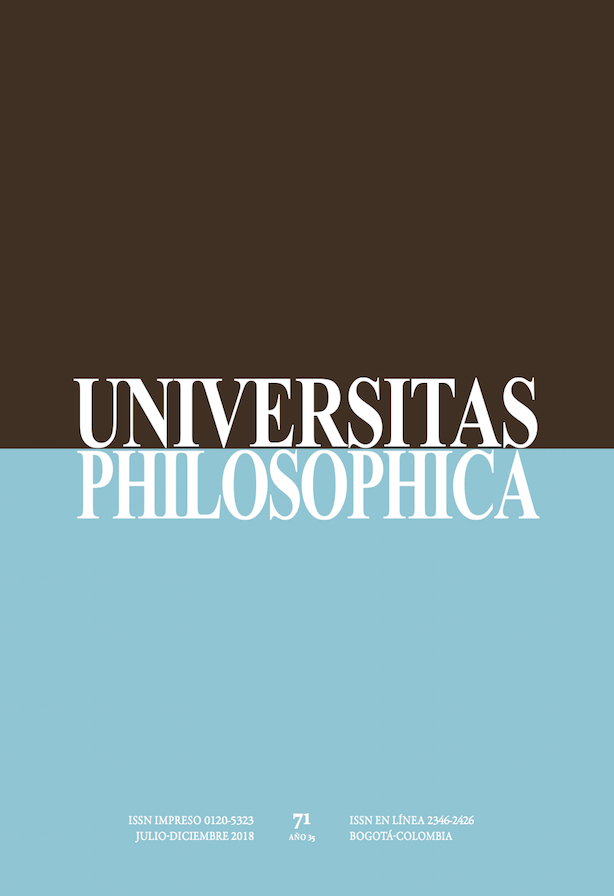Resumen
En este escrito esbozaremos algunas vías que nos conducen a pensar la necesidad de la memoria, inherente a la vivencia del presente. Lo hare- mos en torno a tres líneas temáticas, desde la filosofía de la historia: la relación de pertenencia del pasado a nuestro presente; el problema de la disposición personal del sujeto del conocimiento histórico y su pertenen- cia inevitable al presente en el nivel de acción; y el sentido de una posible experiencia histórica individual y colectiva y su intersección, cuando se trata de establecer si es pertinente hacer una memoria exhaustiva de los que murieron por causa del conflicto armado. Para ello, acudiremos a la filosofía benjaminiana de la memoria y propondremos algunos parentes- cos con las filosofías del olvido, el recuerdo y la memoria de Nietzsche y de Bergson. Buscamos así establecer la realidad del pasado que tiene su base en la existencia virtual del recuerdo y, a partir de ahí, determinar la posibilidad de ser actualizado de este último en la forma de fuerzas vitales, comprometidas en la construcción de un futuro.
Benjamin, W. (1988a). Imaginación y sociedad. Iluminaciones I. Madrid: Taurus.
Benjamin, W. (1988b). Poesía y capitalismo. Iluminaciones II. Madrid: Taurus.
Bergson, H. (1959). Obras escogidas. México: Aguilar.
Deleuze, G. (1987). El bergsonismo. Madrid: Cátedra.
Grupo de Memoria Histórica (2013). ¡Basta ya! Colombia: memorias de guerra y dignidad. Bogotá: Imprenta Nacional.
Grupo de Memoria Histórica (2009). Memorias en tiempo de guerra. Repertorio de iniciativas. Bogotá: Comisión Nacional de Reparación y Reconciliación.
Horkheimer, M. (1983). La métaphysique bergsonienne du temps. L’Homme et la Société, (69-70), 9-29.
Horkheimer, M. (2014). Sur Les deux sources de la morale et de la religion de Henri Bergson. En: F. Arnaud. (Ed.). Annales bergsoniennes (Vol. VII) (pp. 95-98). Paris: PUF.
Jelin, E. (2002). Los trabajos de la memoria. Madrid: Siglo XXI de España Editores.
Lavelle (2008). Religion et histoire. Paris: Les Éditions du Cerf.
Löwy, M. (2005). Walter Benjamin: aviso de incendio. Una lectura de las tesis “Sobre el concepto de historia”. Buenos Aires: Fondo de Cultura Económica.
Macherey, P. (2013). Proust. Entre littérature et philosophie. Paris: Éditions Amsterdam.
Nietzsche, F. (2011). Obras completas (Vol. I). Madrid: Tecnos.
Nietzsche, F. (2014). Obras completas (Vol. II). Madrid: Tecnos.
Mate, R. (2009). Medianoche en la historia. Comentarios a las tesis de Walter Benjamin “Sobre el concepto de historia”. Madrid: Trotta.
Pardo, N. & Ruiz, J. (2017). Víctimas, memoria y justicia: aproximaciones latinoamericanas al caso colombiano. Bogotá: Universidad Nacional de Colombia.
Proust, M. (1993). En busca del tiempo perdido (Vol. 1). Por el camino de Swann. Madrid: Alianza Editorial.
Renouard, M. (2012). Virtuel et réminiscense. En: C. Riquier. (Dir.). Bergson (pp. 285-300). Paris: Les Éditions du Cerf.
Tiedemann-Bartels, H. (2007). “La mémoire est toujours de la guerre”. Benjamin et Péguy. En: H. Wismann. (Ed.). Walter Benjamin et Paris (pp. 133-143). Paris: Les Éditions du Cerf.
Virno, P. (2003). El recuerdo del presente. Ensayo sobre el tiempo histórico. Buenos Aires: Paidós.
Weigel, S. (1999). Cuerpo, imagen y espacio en Walter Benjamin. Una relectura. Buenos Aires: Paidós.
Esta revista científica se encuentra registrada bajo la licencia Creative Commons Reconocimiento 4.0 Internacional. Por lo tanto, esta obra se puede reproducir, distribuir y comunicar públicamente en formato digital, siempre que se reconozca el nombre de los autores y a la Pontificia Universidad Javeriana. Se permite citar, adaptar, transformar, autoarchivar, republicar y crear a partir del material, para cualquier finalidad (incluso comercial), siempre que se reconozca adecuadamente la autoría, se proporcione un enlace a la obra original y se indique si se han realizado cambios. La Pontificia Universidad Javeriana no retiene los derechos sobre las obras publicadas y los contenidos son responsabilidad exclusiva de los autores, quienes conservan sus derechos morales, intelectuales, de privacidad y publicidad.
El aval sobre la intervención de la obra (revisión, corrección de estilo, traducción, diagramación) y su posterior divulgación se otorga mediante una licencia de uso y no a través de una cesión de derechos, lo que representa que la revista y la Pontificia Universidad Javeriana se eximen de cualquier responsabilidad que se pueda derivar de una mala práctica ética por parte de los autores. En consecuencia de la protección brindada por la licencia de uso, la revista no se encuentra en la obligación de publicar retractaciones o modificar la información ya publicada, a no ser que la errata surja del proceso de gestión editorial. La publicación de contenidos en esta revista no representa regalías para los contribuyentes.


